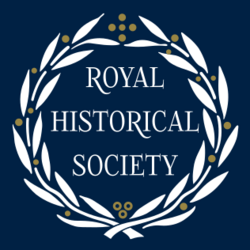Royal Historical Society facts for kids
 |
|
| Abbreviation | RHistS, RHS |
|---|---|
| Formation | 1868 |
| Merger of | Camden Society (1897) with the RHS |
| Registration no. | 206888 |
| Legal status | Charity |
| Purpose | Historical studies |
| Headquarters | University College London, Gower Street, WC1E 6BT |
| Location | |
|
Membership (2021)
|
4,500+ members |
|
President
|
Lucy Noakes |
| Adam Hughes | |
|
Key people
|
Philip Carter, academic director |
|
Main organ
|
Transactions |
|
Staff
|
4 |
|
Formerly called
|
The Historical Society |
The Royal Historical Society (RHS) is a group in the United Kingdom that helps people study history. It was started in 1868. The RHS works to make sure that history is studied well and shared widely.
Contents
How the Society Started
The Royal Historical Society began in 1868. It received a special permission from the King or Queen, called a royal charter. This charter officially recognized the society. For a few years, until 1872, it was simply called the Historical Society.
In 1897, another group called the Camden Society joined with the RHS. The Camden Society had been around since 1838. For a long time, the RHS was mostly like a social club for gentlemen. But in the mid-1900s, it started to play a bigger role. It began to represent historians and the study of history more actively.
What the Society Does Today
The RHS works to encourage historical research in the UK and around the world. It supports all kinds of historians. The society does many things to help historians.
- It speaks up for historians and studies how history is taught.
- It offers training and support, especially for new historians.
- It publishes historical works.
- It gives out grants and money to help with research.
- It also gives awards and special recognition to historians.
The RHS holds many talks and conferences. These events cover different history topics. They usually happen in London. Since 1967, the society has been based at University College London.
How the Society is Run
The Royal Historical Society is managed by a group of trustees. This group is called the council. The President of the RHS leads the council. The President and other council members are chosen from the society's fellows.
There are 22 council members. Each member serves for four years. Every year, the fellows vote for three new council members. These members come from many different backgrounds. They also have various research interests in history.
Who Can Join the Society
The society has different types of members. These include honorary vice-presidents, elected fellows, associate fellows, and regular members.
- Fellows are historians who have made a big contribution to history. This usually means they have written a book or a lot of scholarly work. It can also include organizing exhibitions or editing history journals. To become a fellow, someone who is already a fellow must support your application. The RHS keeps an online list of all its current fellows and members.
Awards and Prizes
The Royal Historical Society gives out several important prizes and awards. These recognize excellent work in history.
- Gladstone Book Prize
- Whitfield Book Prize
- The Alexander Prize
Only two historians have won both the Whitfield Prize and the Alexander Prize:
- A. G. Rosser won the Alexander Prize in 1983 and the Whitfield Prize in 1989.
- Ryan Hanley won the Alexander Prize in 2015 and the Whitfield Prize in 2019.
Leaders of the Society
Here is a list of the people who have served as President of the Royal Historical Society:
- 1871–1872: George Grote
- 1873–1878: John Russell, 1st Earl Russell
- 1878–1891: Henry Bruce, 1st Baron Aberdare
- 1891–1899: Sir Mountstuart Duff
- 1899–1901: Sir Adolphus Ward
- 1901–1905: Sir George Prothero
- 1905–1909: William Hunt
- 1909–1913: William Cunningham
- 1913–1917: Sir Charles Firth
- 1917–1921: Sir Charles Oman
- 1921–1925: Sir John Fortescue
- 1925–1929: Thomas Tout
- 1929–1933: Sir Richard Lodge
- 1933–1937: Sir Frederick Powicke
- 1937–1945: Sir Frank Stenton
- 1946–1949: Robert Seton-Watson
- 1949–1953: Theodore Plucknett
- 1953–1957: Hugh Hale Bellot
- 1957–1961: David Knowles
- 1961–1965: Sir Goronwy Edwards
- 1965–1969: Robin Humphreys
- 1969–1973: Sir Richard Southern
- 1973–1977: Sir Geoffrey Elton
- 1977–1981: Sir John Habakkuk
- 1981–1985: Sir James Holt
- 1985–1989: Gerald Aylmer
- 1989–1993: Francis Thompson
- 1993–1997: Sir Rees Davies
- 1997–2001: Peter James Marshall
- 2001–2005: Dame Jinty Nelson
- 2005–2008: Martin Daunton
- 2009–2012: Colin Jones
- 2012–2016: Peter Mandler
- 2016–2020: Margot Finn
- 2020–2024: Emma Griffin
- 2024-: Lucy Noakes
See also
- The Historical Association
- List of British professional bodies
- List of Royal Societies
- Historiography of the United Kingdom
 | John T. Biggers |
 | Thomas Blackshear |
 | Mark Bradford |
 | Beverly Buchanan |

